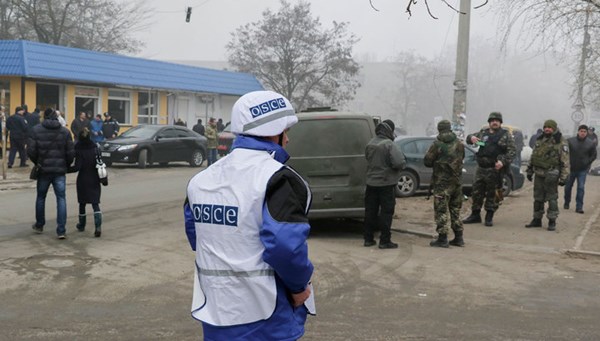Russia blocks OSCE placement at border stretch not controlled by Ukraine
Russia has refused the expansion of the OSCE mission along the entire stretch of the border belonging to the territory of the Donetsk and Luhansk provinces which are temporarily not controlled by the Ukrainian Government, Interfax-Ukraine reports. In connection with this decision, the Ukrainian delegation to the OSCE made a statement expressing deep disappointment in Russia’s sole refusal to give consent.
“Such actions by Russia are evidence of a deliberate unwillingness to facilitate the de-escalation of the situation in the Donbas, and a deliberate intention to prolong the shipments of heavy weaponry, military equipment and ammunition, militants and mercenaries, and to support terrorist activity in Ukrainian territory,” reads the Ukrainian Foreign Ministry’s comment in conjunction with the OSCE Permanent Council’s ruling to extend the mandate, which was published on the Ukrainian Foreign Ministry’s official website.
The Ukrainian delegation has called on Russia to steadily fulfill its obligations as part of the Minsk Agreements, especially provision 4 of the Minsk protocol from September 5, 2014, regarding the establishment of OSCE control and permanent monitoring of the temporarily uncontrolled portion of the Ukrainian-Russian state border, with the creation of a safety zone along the border. Progress in this regard is critically important for the de-escalation of the situation in the Donbas.
Russian President Vladimir Putin said that Russia will not permit the closing of the border with the Donbas, but still wants good relations with Ukraine. He made a statement to this effect at a session of the Valdai international discussion club, UNIAN reports.
According to Putin, Russia has constantly been asking for the OSCE mission on the demarcation line to be armed. However, he said that Petro Poroshenko offered to create conditions for the OSCE SMM to be protected by an armed UN group, and Russia agreed. “And they weren’t satisfied with this. Let’s interpret this broadly now. You understand what we are afraid of, if it can be said that we are afraid of something. If, before these territories are given a special status, according to the law which was adopted by the Rada and has now been extended by a year, if no law on amnesty is adopted, then closing the border between Russia and the unrecognized republics will lead to a situation on the same level as Srebrenica. There will be a massacre there. We cannot allow this and will never allow it,” Putin said.
He said that the entire situation cannot be shifted to Russia. “That won’t work. Together, now, let us influence today’s authorities in Kyiv, to make them take some steps towards normalization. We will work in solidarity and do everything to ensure that the situation normalizes,” he said.
“We need a democratic and friendly Ukraine,” Putin emphasized.
He said that Russia had willingly given consent for the former USSR member states to become independent states, and now it wants “to have a friendly neighboring state”.
The OSCE extended the mandate of the monitoring mission at the Russian “Donetsk” and “Gukovo” border crossing points until January 31, 2018.
Putin also said that Russia would continue to work in the Normandy Format, and strive to implement the Minsk agreements.
